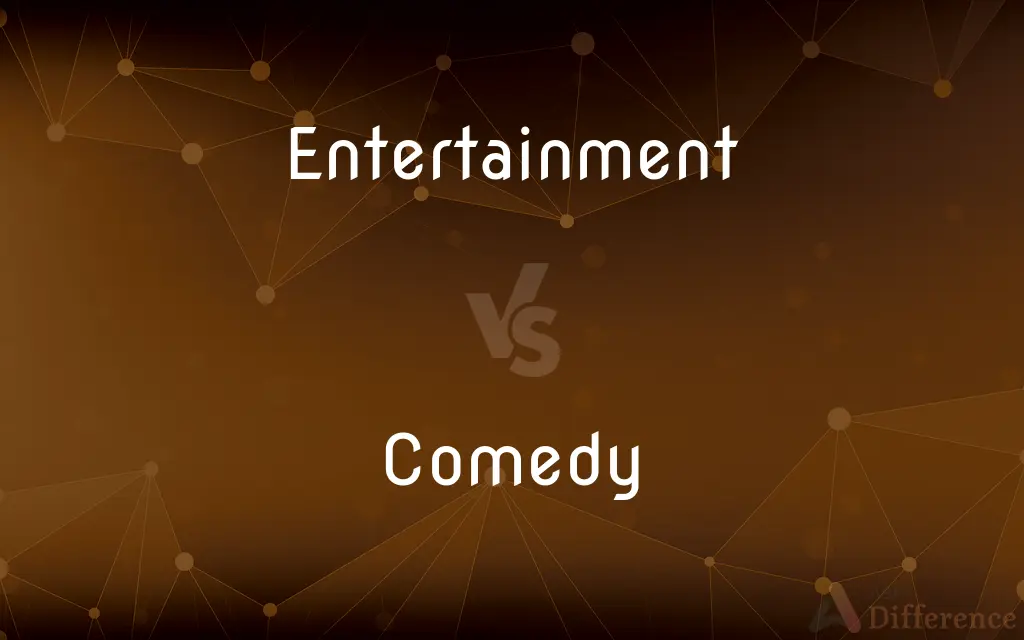Entertainment vs. Comedy — What's the Difference?
By Urooj Arif & Maham Liaqat — Updated on February 29, 2024
Entertainment encompasses all forms of activities that provide amusement or enjoyment, while comedy is a genre of entertainment focused specifically on humor and laughter.

Difference Between Entertainment and Comedy
Table of Contents
ADVERTISEMENT
Key Differences
Entertainment is a broad category that includes various forms of activities and performances designed to amuse, engage, and provide pleasure to an audience. This can range from movies, music, and theater to sports, games, and reading. Comedy, on the other hand, is a specific genre within the entertainment spectrum, characterized by its intention to provoke laughter and provide amusement through humor. It can manifest in many forms, including stand-up performances, comedic films, sitcoms, and satirical books.
Entertainment purpose is to captivate the audience's attention and offer a break from the mundane or everyday life, catering to diverse tastes and interests. Comedy often explores the human condition and societal norms through wit, satire, and irony, offering both entertainment and, at times, critical commentary on life's absurdities.
Entertainment serves as an umbrella term that includes a wide range of enjoyable activities, comedy zeroes in on those that specifically aim to elicit humor. Not all entertainment is comedic, as the entertainment industry caters to a wide array of emotions and experiences, from drama and horror to action and romance. However, comedy plays a crucial role within entertainment, often used as a tool to lighten the mood, enhance storytelling, and connect with audiences on a relatable level.
The relationship between comedy and entertainment is symbiotic. While comedy provides a unique way to entertain by focusing on laughter and amusement, the broader field of entertainment offers a platform for comedy to reach diverse audiences. The effectiveness of comedy relies on its context within entertainment, as what is humorous can vary greatly among cultures, individual tastes, and social contexts.
Comparison Chart
Definition
Activities designed to amuse, engage, and provide pleasure.
A genre focused on humor to provoke laughter.
ADVERTISEMENT
Scope
Broad, encompassing various forms like movies, music, sports.
Narrow, specifically aimed at creating humor.
Purpose
To captivate and offer enjoyment or a break from daily life.
To elicit laughter and amuse through wit and humor.
Forms
Includes films, theater, music, games, sports, etc.
Stand-up, comedic films, sitcoms, satire, etc.
Emotional Focus
Can evoke a wide range of emotions, from suspense to joy.
Primarily targets amusement and laughter.
Compare with Definitions
Entertainment
Recreational activities like sports and games.
Soccer is known worldwide as a favorite form of entertainment.
Comedy
Satirical works critiquing society or politics.
The book uses comedy to critique contemporary politics.
Entertainment
Digital content including video games and online videos.
Video games have become a major sector in the entertainment industry.
Comedy
Genre of entertainment that focuses on humor.
The comedy show had everyone laughing from start to finish.
Entertainment
Engaging in hobbies or leisure activities.
Painting is not just a hobby but also a source of entertainment for many.
Comedy
Situational comedies in television and film.
That sitcom is a classic in television comedy.
Entertainment
Any activity providing enjoyment and amusement.
Watching movies is a popular form of entertainment.
Comedy
Stand-up routines by comedians.
His stand-up comedy draws on everyday life for laughs.
Entertainment
Live performances such as concerts and theater shows.
The concert provided an unforgettable night of entertainment.
Comedy
Sketch comedy comprising short humorous scenes.
The sketch comedy troupe performed a series of hilarious vignettes.
Entertainment
Entertainment is a form of activity that holds the attention and interest of an audience or gives pleasure and delight. It can be an idea or a task, but is more likely to be one of the activities or events that have developed over thousands of years specifically for the purpose of keeping an audience's attention.
Comedy
Comedy (from the Greek: κωμῳδία, kōmōdía) is a genre of fiction comprised of discourses or works intended to be humorous or amusing by inducing laughter, especially in theatre, film, stand-up comedy, television, radio, books, or any other entertainment medium. The term originated in Ancient Greece: in Athenian democracy, the public opinion of voters was influenced by political satire performed by comic poets in theaters.
Entertainment
The act of entertaining.
Comedy
Professional entertainment consisting of jokes and sketches, intended to make an audience laugh
The show combines theatre with the best of stand-up comedy
A cabaret with music, dancing, and comedy
Entertainment
The art or field of entertaining.
Comedy
A play characterized by its humorous or satirical tone and its depiction of amusing people or incidents, in which the characters ultimately triumph over adversity
Shakespeare's comedies
Entertainment
Something that amuses, pleases, or diverts, especially a performance or show.
Comedy
A dramatic work that is light and often humorous or satirical in tone and that usually contains a happy resolution of the thematic conflict.
Entertainment
The pleasure afforded by being entertained; amusement
The comedian performed for our entertainment.
Comedy
A dramatic composition, or representation of a bright and amusing character, based upon the foibles of individuals, the manners of society, or the ludicrous events or accidents of life; a play in which mirth predominates and the termination of the plot is happy; - opposed to tragedy.
With all the vivacity of comedy.
Are come to play a pleasant comedy.
Entertainment
The act of receiving as host, or of amusing, admitting, or cherishing; hospitable reception; also, reception or treatment, in general.
The entertainment of Christ by faith.
The sincere entertainment and practice of the precepts of the gospel.
Comedy
Light and humorous drama with a happy ending
Entertainment
That which entertains, or with which one is entertained;
Theatrical entertainments conducted with greater elegance and refinement.
Comedy
A comic incident or series of incidents
Common Curiosities
Can entertainment exist without comedy?
Absolutely, as entertainment encompasses a broad range of genres and activities not limited to humor.
Why is comedy important in entertainment?
Comedy is important because it provides laughter and joy, helps relieve stress, and can offer insightful commentary on societal norms.
Is all comedy considered entertainment?
Yes, comedy is a subset of entertainment specifically focused on humor and laughter.
How does comedy enhance entertainment?
Comedy enhances entertainment by adding humor, making content more engaging and relatable, and providing light-hearted relief.
How do personal preferences affect enjoyment of comedy?
Personal preferences significantly impact what individuals find humorous, as comedy is subjective and varies greatly among different people.
How has the role of comedy in entertainment evolved over time?
Comedy has evolved to encompass a broader range of topics and styles, reflecting changes in society, culture, and what audiences find humorous.
Do cultural differences impact what is considered comedy in entertainment?
Yes, cultural differences greatly influence what is considered humorous, as comedy often relies on shared experiences and values.
How do technological advancements affect comedy in entertainment?
Technological advancements expand the platforms for comedy, allowing for innovative forms and wider distribution.
Are there entertainment forms that exclusively rely on comedy?
Yes, forms like stand-up comedy and sitcoms primarily rely on humor for their appeal.
Can a drama be considered entertainment if it includes comedy elements?
Yes, many dramas include comedic elements to provide relief and contrast, enhancing the overall entertainment value.
What role does satire play in comedy and entertainment?
Satire plays a critical role by using humor to critique and comment on societal issues, adding depth to entertainment.
Can comedy be found in all entertainment mediums?
Comedy can be integrated into virtually all entertainment mediums, although its presence and style may vary.
How do performers blend comedy and entertainment?
Performers blend comedy with entertainment by incorporating humor into various formats, from music and theater to digital content.
Why do some people prefer comedy over other entertainment genres?
Many prefer comedy for its feel-good factor, ability to induce laughter, and the relief it provides from daily stress.
What distinguishes dark comedy from other comedy types in entertainment?
Dark comedy distinguishes itself by deriving humor from serious, taboo, or somber topics, often challenging traditional notions of what is funny.
Share Your Discovery

Previous Comparison
Yes vs. Yap
Next Comparison
Mestizo vs. MulattoAuthor Spotlight
Written by
Urooj ArifUrooj is a skilled content writer at Ask Difference, known for her exceptional ability to simplify complex topics into engaging and informative content. With a passion for research and a flair for clear, concise writing, she consistently delivers articles that resonate with our diverse audience.
Co-written by
Maham Liaqat













































